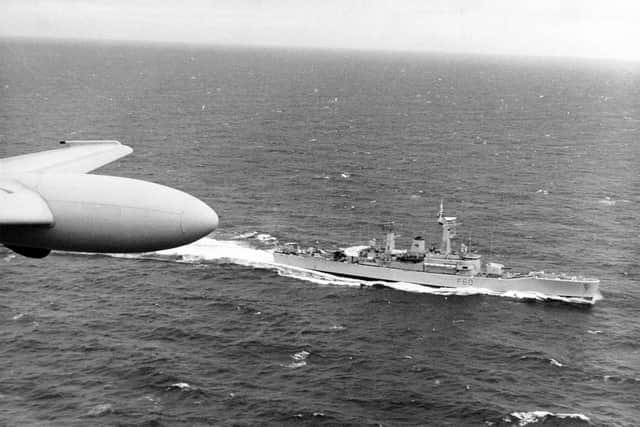Jersey fishing conflict brings back Cod War memories in Fleetwood
and live on Freeview channel 276
Britain’s distance water fishermen found themselves in a state of direct conflict with the nation of Iceland, and the outcome of this unfortunate struggle – three conflicts spanning around 20 years – was catastrophic for the port.
Yesterday, two Royal Navy vessels were patrolling waters around Jersey amid concerns of a possible blockade of the island.
Advertisement
Hide AdAdvertisement
Hide AdHMS Severn and HMS Tamar have been deployed by the UK Government to “monitor the situation” at the Channel Island amid a protest by French fishing vessels at the port of St Helier over the lack of access.


French maritime minister Annick Girardin warned that the country is ready to take “retaliatory measures”, accusing Jersey of dragging its feet over issuing new licences to French boats.
Fleetwood historian Dave Pearce, who reported on the Cod Wars at the time, said the Jersey fishing conflict has ‘brought back memories’ of the maritime disputes that involved Fleetwood fishermen in the days when the port was the country’s third biggest fishing centre.
Dave said: “These were the Cod Wars which broke out when Iceland extended her territorial fishing limits and banned fishermen from Britain and other nations from their rich fishing grounds.
Advertisement
Hide AdAdvertisement
Hide Ad“The Fleetwood crews did not accept the new rules and carried on fishing.
“The Icelanders retaliated by sending in patrol ships known as gunboats to hassle the fishermen and disrupt their work.
“Sometimes they cut away the fishing gear which the Fleetwood ships were towing along the seabed.
“This was a very dangerous tactic which could have killed or injured the crewmen and there might easily have been collisions between the gunboats and trawlers.”
Advertisement
Hide AdAdvertisement
Hide AdDave said the Fleetwood men fought back by playing Rule Brittania and Land of Hope and Glory on their loudspeakers and there was a lot of ‘shouting and swearing’ on the radio.
Dave said over the years the conflict got worse.
He said: “It all started in 1958 when the limit went from four to 12 miles. In 1972 it went to 50 miles and in 1975 to 200 miles. That was the death knell of Fleetwood trawlers fishing at Iceland and the last trip was in 1982.
“Once again, the Icelanders got their way.
"The Royal Navy sent ships to try and protect the British trawlers but they were forbidden from taking extreme action. Sometimes they shepherded the ships into specific areas known as boxes which had codenames like Butterscotch, Spearmint and Toffee Apple.
“Finally talks were held between the British government and the Icelandic officials which could have lead to a licensing system allowing Fleetwood ships to continue fishing at Iceland under new rules. But the talks broke down without a result.
Advertisement
Hide AdAdvertisement
Hide Ad“British fishermen had been catching fish around Iceland since the 14th century and there was always a strong feeling in fishing communities like Fleetwood that they had an historic right to do so.
“Trawler skippers were paid on results and that tempted some to go poaching by fishing inside the limit line . If they were caught by the gunboats it meant a heavy fine in an Icelandic court.”